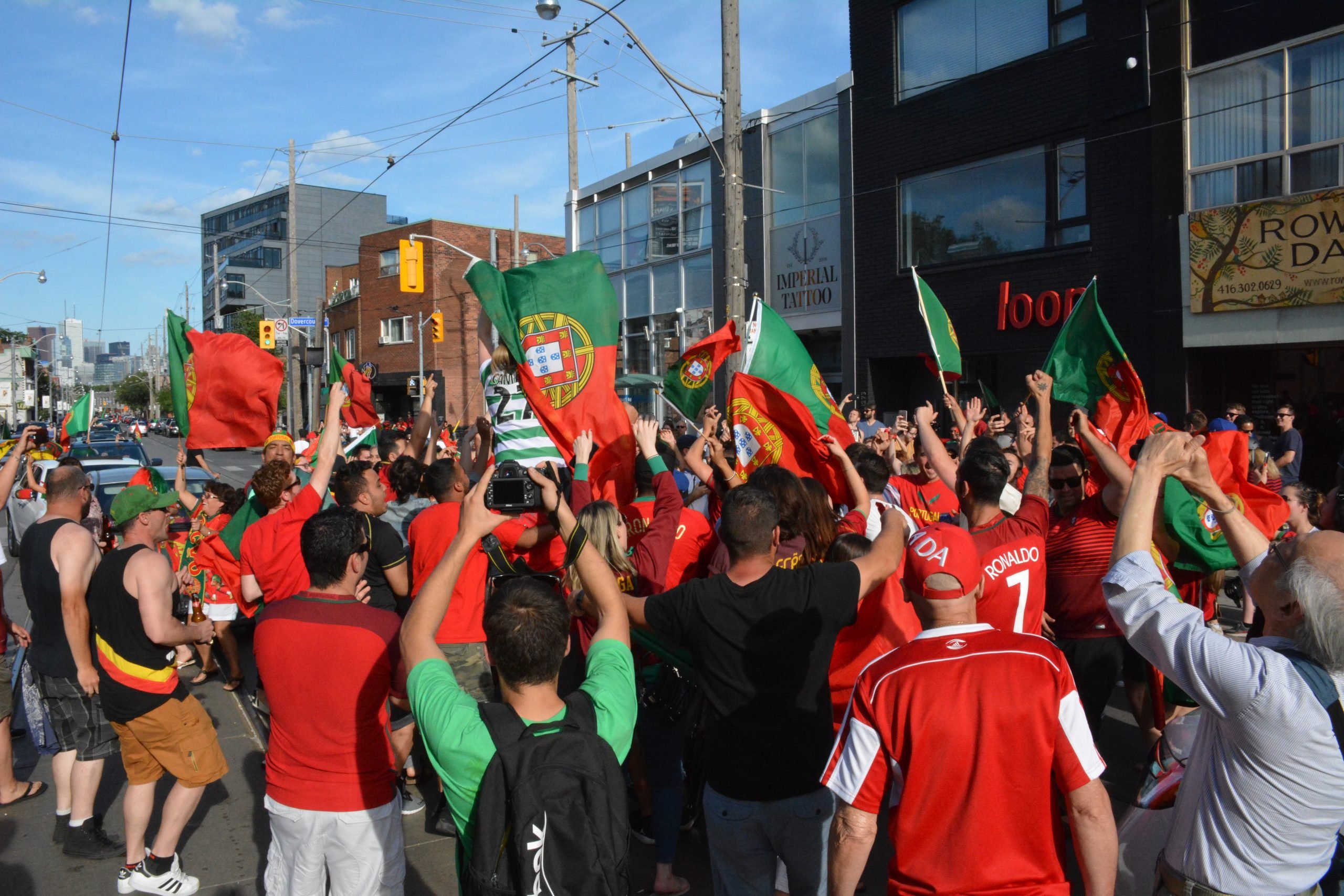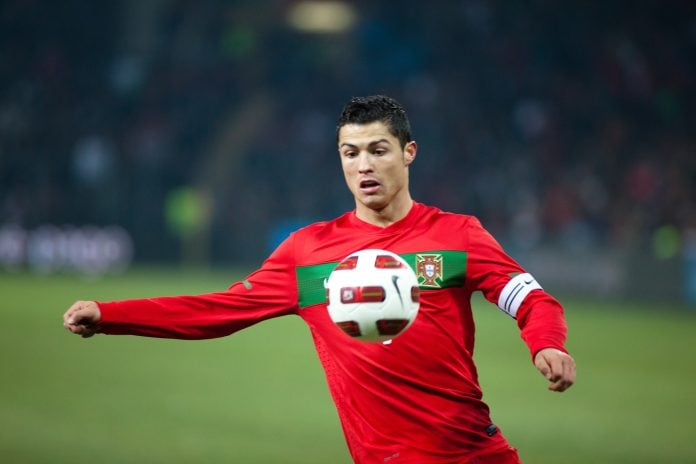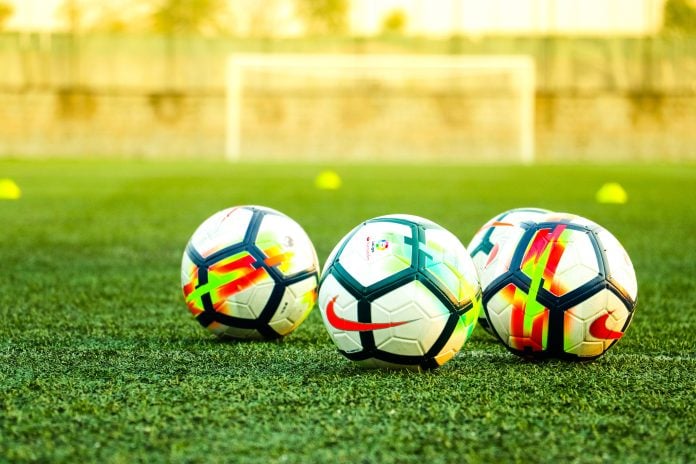Football has always been like a religion to the Portuguese. However, first founded in 1914, the Portugal National Football Team was not always successful. Great strides were made along the decades, culminating in a stronger team with iconic players such as Eusebio, Figo, and Cristiano Ronaldo.
Let’s take a look at everything you need to know about the Portugal National Team, from a historical timeline and key facts, as well as an overview of the women’s team that has been making great strides recently.
Key Facts about the Portugal National Team
- Full name in Portuguese: Seleção Portuguesa de Futebol
- Managed: Portuguese Football Federation
- Founded: 1914
- Captain: Cristiano Ronaldo
- Coach: Fernando Santos
- Assistant coaches: Ilidio Vale, Nuno Sampaio, Fernando Meira
- Goalkeeping coach: Rui Ouriques
- Top goalscorers: Cristiano Ronaldo (117), Pauleta (88), Eusebio (64)
- Team home kit: Portugal’s traditional home kit is red and green like the Portuguese flag. Alterations have been made over the years, such as dark burgundy and light scarlet.
- Team away kit: Portugal’s away kits vary a lot. Usually, they are white with blue shorts or red and green highlights. A fully black kit has also been used.
Portugal National Football Team History & Timeline
1930s
Over 15 years after the Portugal National Football Team was founded, things were not looking well. Portugal was not invited to the 1930 World Cup.
Four years later, Portugal took part in the FIFA World Cup Qualification but failed to eliminate Spain. Again in 1938, Portugal failed to eliminate Syria in the qualification for the World Cup.
The next few decades would not prove very successful for Portuguese football.
1950s – Early 1960s
The largest defeat in Portuguese history happened in the 1950 qualification, where Portugal lost 10-0 to England. Portugal did not qualify again in 1954, losing against Austria with a 9-0 aggregate defeat of two games.
In the 1958 FIFA World Cup Qualification, the Portugal National Football Team won their first qualification match, a 3-0 victory against Italy. Sadly, this was not enough for them to qualify.
In 1960, the European Football Championship was created, but Portugal lost 6-3 on aggregate.
In the 1962 FIFA World Cup Qualification, Portugal was in the group against England and Luxembourg. As only the team that won in that group could qualify, Portugal, making second, did not make it.
Portugal did not qualify again for the second Euro in 1964, losing against Bulgaria.
1966 – 1970s
In 1966, took a twist to the positive. Portugal was able to finally qualify for the FIFA World Cup in 1966, topping the group against Czechoslovakia, Romania, and Turkey.
The Portugal National Football Team had their best World Cup to this day, defeating the Soviet Union 2-1 in the third place match. The iconic player Eusebio was the top scorer of the World Cup with nine goals.
Four years later, however, Portugal did not qualify as it finished last in its group. The team also failed to qualify for the 1972 Euro and both the 1974 and 1978 World Cup.
1980s – Early 1990s
The very early ’80s were not great. Portugal did not qualify for the 1980 Euro or 1982 World Cup.
However, by 1984, Portugal qualified for the Euro and actually made it to the semi-final against France. This match is considered one of the best in the history of the Euro. France scored in the 114th and 119th minutes, eliminating Portugal 3-2.
Portugal qualified for the 1986 World Cup for the first time since 1966. However, during the competition, the team went on a strike due to the Saltillo Affair, refusing to train between their first and second games, and were later eliminated after a loss to Morocco.
The Saltillo Affair was when the Portuguese Federation accused players of doing, although tests later proved this to be untrue.
Portugal did not qualify for the 1988 and 1992 Euro, as well as the 1990 and 1994 World Cup.
1995 – 2006
While the last 90s were not incredible, the team between 1995 and 2006 is known as the “golden generation.” The team consisted of young players who had won the FIFA U-20 in 1989 and 1991.
While Portugal did not qualify for the 1998 World Cup, it made it to the 2000 Euro but were eliminated in the semi-finals against France 2-1.
Portugal did not make it to the 2002 World Cup. There were many media reports of unprofessionalism and bad attitude by the players. Manager António Oliveira was fired after the World Cup.
The UEFA Euro 2004 was hosted in Portugal, and Luiz Felipe Scolari managed the team. Portugal made it all the way to the final with Greece but lost 1-0. Cristiano Ronaldo was selected for the UEFA Euro All Stars Team that year as his career progressed.
In the 2006 World Cup, Portugal reached their first World Cup semi-final since 1966 but lost 1-0 against France. Portugal won the “Most Entertaining Team” award for their performance in the World Cup.
2006 – 2014
The post-golden generation period saw mixed results, as many young players left their international careers. Portugal qualified for the 2008 Euro but lost a quarter-final with Germany 3-2. After the Euro, Scolari went to Chelsea, and Carlos Queiroz took over the Portugal national team.
In the 2010 World Cup, Portugal beat Bosnia and Herzegovina in a play-off but later lost to Spain in the round of 16, 1–0.
Carlos Queiroz eventually got fired after a series of scandals such as blocking doping testing and being insulting to testers. Paulo Bento took over as head coach.
Portugal qualified for the 2012 Euro, later defeating the Czech Republic 1-0 in the quarter-finals. However, they lost the semi-final against Spain as Portugal lost 4-2 on penalties after a 0-0 tie.
In the 2014 FIFA World Cup qualifying, Portugal was drawn into Group G with the US, Germany, and Ghana. Their first match against Germany was the worst defeat in World Cup history at 4-0. While they won 2-1 against Ghana, Portugal was eliminated as it had an inferior goal difference to the US, despite a 2-2 tie with the team.
2014 – Present Day
2016 was one of the best years for the Portugal National Team, with the team winning the Euro that year. However, the qualifiers began badly as Portugal lost 0-1 at home against Albania in 2014. Bento was dismissed and replaced by Fernando Santos.
The team then qualified as group winners and advanced into the knockout stage. Portugal beat Croatia 1-0, Poland 5-3, and Wales 2-0 in the semi-finals.
The final was against France. At the beginning of the game, Ronaldo got injured but was replaced by Eder. To everyone’s surprise, he scored a goal in the 109th minute, winning the Euro!

In the 2017 FIFA Confederations Cup, Portugal made it to the semi-finals but lost to Chile, but then beat Mexico in the third place game.
Portugal qualified for the 2018 FIFA World Cup but was eliminated in the round of 16 in a 2-1 defeat against Uruguay.
In 2018, Portugal was announced as the host of the Nations League Finals, as it won against Italy and Poland in the UEFA Nations League. Portugal defeated the Netherlands 1-0 in the finals in Porto, with Goncalo Guedes scoring the only goal in the 60th minute.
While Portugal successfully qualified for the Euro 2020, the team finished 13th overall after winning against Hungary, drawing with France, and losing to Germany and Belgium. This was Portugal’s lowest ranking in the history of the Euro.
Will Portugal be in the 2022 World Cup?
On March 24, 2022, Portugal secured its place in the 2022 FIFA World Cup. The team was put into Group A for the qualifiers with Azerbaijan, Luxembourg, Ireland, and Serbia. Portugal lost against Serbia but then beat Turkey 3-1 in the playoff semi-final. Less than a week later, Portugal defeated North Macedonia 2-0.
The 2022 FIFA World Cup is scheduled to take place in Qatar from November 21 to December 18.
Portugal National Team Players World Cup 2022
Goalkeepers
- Anthony Lopes
- Rui Patricio
- Diogo Costo.
Defenders
- Joao Cancelo
- Ricardo Pereira
- Domingos Duarte
- Goncalo Inacio Pepe
- Ruben Dias
- Nuno Mendes
- Raphael Guerreiro
Midfielders
- Danilo Pereira
- Joao Palhinha
- Ruben Neves
- Bruno Fernandes
- Joao Moutinho
- Joao Mario
- Otavio
Forwards
- Pedro Goncalves
- Andre Silva
- Bernardo Silva
- Cristiano Ronaldo
- Diogo Jota
- Goncalo Guedes
- Rafa Silva
Portugal National Team’s Captain Cristiano Ronaldo
Cristiano Ronaldo was born in Funchal, Madeira, on February 5, 1985. The Portuguese player is a forward for Manchester United and is the captain of the Portugal national team. To many, he is considered the best soccer player in the world.
Ronaldo has won five Ballon d’Or awards and four European Golden Shoes. His track record is astonishing, with 32 trophies in his career. Ronaldo holds many records, including for most appearances in a game (183) and goals (140).
He was ranked the world’s highest-paid athlete by Forbes in 2016 and 2017, as he is the first footballer to earn 1 billion dollars in his career.
The forward began his football career in Sporting CP and then signed with Manchester United at 18. In 2009, he was the most expensive football transfer at the time when he signed with Real Madrid for €94 million.
In 2018, he signed with Juventus in a €100 million transfer. In 2021, he returned to Manchester United, where he remains.

Portugal National Team’s Coach Fernando Santos
Fernando Santos was born October 10, 1954, in Lisbon, Portugal. He is the manager for the Portugal national team, as well as a former defender.
After retiring as a defender, he became a coach in 1988. Throughout his career, Santos managed Portugal’s Big Three (Benfica, Sporting, and Porto). He won five major titles with Porto and also managed Estoril.
In the early 2000s, he relocated to Greece, where he managed mostly AEK Athens and PAOK. In 2010, he coached the Greek national team for the World Cup and Euro.
In September 2014, he was chosen as the manager of Portugal after the dismissal of Paulo Bento. In 2016, he led the team to the finals with France, where Portugal won its first Euro. He is still the current coach for Portugal and will be leading the team to the 2022 World Cup in Qatar next winter.
Portugal Women’s National Team
While the Portuguese women’s national football team was left under the radar since its founding, in recent years, it has been making major strides.
In 2017, Portugal qualified for the UEFA Women’s Euro, which was the team’s first appearance in a major tournament. However, they finished last in their group.
In 2019, Portugal finished third in their qualifying group for the FIFA Women’s World Cup. Although they were unable to qualify, they worked hard to be able to do so for the UEFA Women’s Euro.
In May 2020, the Portuguese Football Federation (FPF) released a salary restriction announcement for women’s leagues that was deemed incredibly discriminatory. It established a €550,000 salary cap on women’s clubs.
As a result, female players organized an activist movement called Football Without Gender to draw attention to this. In July, the federation retreated from this initiative after criticism.
In 2022, Portugal qualified for the Women’s Euro due to unique circumstances. Portugal won all the qualifying games except for two against Finland and Scotland. The team reached the play-off stage against Russia but unfortunately lost. However, due to the invasion of Ukraine, Russia was banned from the Women’s Euro, and Portugal took its place!


